

Interview with Mark Webber
Atlas F1 Magazine Writer
If there is anyone who can fully appreciate Mark Webber's remarkable success in consolidating his position within Formula One, it's a fellow Australian who has waited for almost two decades to see a local talent make it into the pinnacle of motor racing. David Cameron, an Aussie in exile, got together with Webber - as well as his team boss Paul Stoddart - at the Italian Grand Prix for a chat about his past season, his plans for next year, and the burden of representing the nation Down Under. At the very least, they got to practice their accent. Exclusive for Atlas F1
The Formula One television coverage in Australia is bad anyone would tell you that, even Bernie Ecclestone. Races are rarely aired live, the majority of them being "tape delayed", normally very late at the night (or early in the morning, depending on your perspective).
Australians love motor racing, but few, if any, actually made it to the pinnacle of motor racing in the last couple of decades. Eastlake and Jones held enthusiasm for this Webber guy, and they would pass on any information they could about his burgeoning F3 career, as well as bemoan the fact that very few Australian companies were supporting him. It was inevitable that I became intrigued so few Aussies make it to Europe, and most of them fall by the wayside - but with no other source of information, I never really had the opportunity to follow Webber's career closely and figure out how he worked his way through the junior ranks.
Fast forward half a decade or so, and Webber has made it into Formula One. As it happens, so did I if only for a brief weekend at Monza, for the Italian Grand Prix, where I was assigned by Atlas F1 to interview Mark Webber. It was a chance for me to get to meet (with apologies to David Brabham) the first real Aussie hopeful since Alan Jones (or at least an opportunity for a couple of exiled Aussies to practice their accent).
The 2003 Mystery
With just a couple of races to go before the 2002 season comes to an end, next year's game of musical chairs is almost done, and yet Webber's whereabouts for 2003 remain unknown. For a while, he was a sure candidate for a Jaguar contract, with sources on both side stating the deal is all but done. Come the Italian Grand Prix, where Jaguar scored their first podium in more than a year, the deal didn't seem to remain viable.
Webber, though, doesn't look worried. "I know exactly what we're looking at, but I'm not going to tell you," he says, laughing. He does bring up an interesting option nevertheless. When I mention the possible teams not naming any of them myself he himself lists "Jaguar, Toyota, Minardi and Jordan" as possible options. Jordan? Where on earth did that option come from? He remains coy about any other details, and it's hard to tell with Webber if he just gave you a big hint or a big smokescreen. Oh well, if he does end up in a Jordan remember that you read it here first!
"I haven't seen a downside [to working with Flavio] at all yet" Webber responds. "I've got to perform, and no one's going to take me if I'm not performing, whether it's a team or a management, so I don't think it's a huge issue."
DC: Looking at Alonso, though, don't you feel that perhaps he's taking now the racing seat that could have been yours, had you stayed with Renault?
Webber laughs. "I could be ahead of him next year," he says, "so I'm not too disappointed."
DC: Last month you had Anthony Davidson as your teammate for a couple of races and while you still outqualified and outraced him, did you feel any extra pressure?
Webber: "Yeah, I suppose I was a bit of a sitting duck he had absolutely nothing to lose and I did. He's the guy who comes in for his first few races or whatever, but John, my engineer, said to me: 'he's actually done more F1 testing than you ever had', so he's got a lot of experience in F1. He knew basically what everything did, and it was good for me to have somebody like that, and we still had to work hard. But it was good to come out of that battle on the right side of it."
DC: I find it interesting that all of a sudden there are a lot of people talking about Davidson, and he now seems to be in competition with you for the remaining drives next year.
Webber: "There are so many guys trying to get into Formula One, trying to take my position, Montoya's, Ralf's, Michael's, so week in week out we've got to perform. There are so many guys trying to come in, and I'm not getting up in the morning and thinking about Anthony Davidson taking my seat I'm not really worried about it it'll take care of itself."
2002 in Retrospect
Webber seldom looks worried about anything, and sitting in the paddock it seems strange to think of Webber as a rookie driver. Over the weekend I saw him talking to mechanics, sponsors, journalists and people up and down the grid, and he seemed so at ease that anyone who didn't know him would assume he had been a part of the circus for years.
The fact that Webber drives for Minardi - and not for Ferrari or McLaren, for that matter - makes little difference in the demands and the discipline which is required of him throughout the weekend. If anything, he has a much tougher challenge to face. "Well, sure there are goals that have got to be reached, but what motivates me is doing what we did today extracting the best out of the car in qualifying" Webber explains.
"We've had some races where we've made the bigger boys have tough weekends, we've been racing with them and outqualifying them. But it can be difficult to get out and do a great lap and still be on the last row of the grid. That's horrible. This is a learning phase for me and a good stepping stone I hope. There have been a lot of great guys driving at Minardi and I hope that I can go on and do a couple of things that the other guys have done in the past."
DC: Obviously Melbourne where you finished fifth and scored the team's first points in 2 years - was the high point of the season. But what other highlights have you had this year?
Webber: "Monaco was great there were a lot of problems at the end of the race, but we were very competitive all weekend at Monaco. Magny Cours was another great weekend for us. I thought the Brazilian race that was good, Imola was good, Silverstone's qualifying
We've had a lot of good."
DC: What about the low points, then?
Webber: "We've had a few rough weekends. Barcelona was tough, of course the wing failures that was a really tough weekend of course. Spa, that was a nightmare, we had a lot of problems with the car. I was a bit frustrated with having to walk back to the pits all the time, but there's not a lot you can do about that personally."
DC: You've had an amazing reliability record this year. I think you finished eight races in a row that's pretty rare.
Webber: "Yeah that was something that I also wanted to do. It's one of those things that I can take away and learn from, because in Grand Prix every race changes in itself and everyone's got to have that in their databank. So all in all we've had a very good reliability record this year, but the financial constraints the team has been under have made things very difficult."
DC: Has the search for monetary support affected your driving at all?
The Australian Connection
Webber has gone a hell of a long way from Queanbeyan - in rural New South Wales - to the lofty heights of Formula One. But the Australian link is likely to remain a strong one for as long as he is the only Australian driving in Formula One. Seeing him talking on Saturday afternoon at the Minardi motorhome with Ryan Briscoe, I wondered if he felt that he was representing the Australian drivers coming through the ranks.
"Yes," Webber replies. "It's been a long time since David (Brabham) was in Formula One, and now I'm in Formula One - I've been in Europe a long time, I know a lot of people in the industry - so I'd like to believe I can help Ryan. He's got some great people looking after him; he's got a Toyota contract in his back pocket, which is not to be sniffed at, as not many Aussies have had that at that stage of their career. The thing is you just learn, and at this stage (you need to be) making the right decisions off track as well. I probably am a bit of an old man when it comes to that." Needless to say, Webber is just 25 years old.
DC: With the Australian dollar being so weak, how hard has it been to get through the ranks with these budgetary problems?
Webber: "Very, very difficult. I think this is what is so hard for all the Aussies coming over. We have so much talent in Australia, but to make that step
The first 24 months, when you leave home, is so hard. And you have to work very hard yourself. Working, trying to earn pounds and make ends meet - it's nearly impossible. You have to work very hard, because there's no real 'free' drives at that stage.
"I was lucky that I had some support in the UK at that stage - in Formula Ford I had Duckham's oils, and they paid for half of my Formula Ford costs. Alan Docking helped me out a lot in Formula 3. So what I had to put in, what Australia had to put in
I don't think a lot of people would believe what it took coming from Australia."
DC: For much of your career you've had Australians around you you mentioned Alan Docking in Formula 3, but there were also David Campese originally as management, and now Paul Stoddart at Minardi. It seems that being Australian also helped your career.
DC: And now that you've actually made it here, do you think that will open some doors for the younger Australian drivers coming through?
Webber: "I think so. I hope so. Australia had one of the best Olympics ever, the country is on a high, although there's not oodles of cash rolling out of the place at the moment, and it's hard to justify giving a guy who wants to race cars half a million dollars on the other side of the world - it's very difficult for them to get their head around that. But I hope that with what happened in Melbourne, with someone up there hopefully flying the flag a little bit, it will help lots of guys trying to get to F1 who are very close, but also guys who are driving back in Australia now, that if you apply yourself and dedicate your life to it you can probably get there."
Behind a Championship Contender
Webber himself "got there" alright. The boy who once used to sneak into his father's Yamaha dealership to ride motorbikes, who watched F1 on television and said "I want that", who left home in his teens to live alone on the other side of the world that boy is now respected by the fans, team owners and fellow drivers alike. "I just thought I'd try to take it as far as I could," he says, reflecting back.
DC: Has your driving style changed over the years, with the different categories of racing you've competed in - from F3 to F3000 to Le Mans to F1?
Webber: "I don't think so, mate. I think I've always been a guy who's liked the front end of the car to be working quite well. You have to change slightly for the different categories, but I've always liked a very pointy car - I don't like understeer - but I don't think my style has changed a great deal."
DC: You once said that if you took anything from being lapped by Michael Schumacher it was that you would watch the way he runs around a corner and try and emulate that. Do you think your driving style is similar to anyone on the grid in particular?
Webber: "It's difficult to say - I worked with Jenson and Fisichella last year, and Giancarlo and I have a pretty similar set up. Fisi is also someone who needs a very good front end on the car, and Jenson's a guy who likes a little bit of understeer, wants to have that to play with. You know, someone like Michael has a totally different car to what I've got, and he does some things that might be impossible because I've got a totally different vehicle, but still, sometimes you can learn off someone like that."
Webber: "Well, you can only do that when you've got the same material. When I worked for Renault last year I was driving with Jenson and Fisi, but as they were the race drivers they knew the car and everything a lot better then I did, but it was a good year and I learnt a lot. Obviously this year it's Alex and potentially he's a little out of his depth.
"I have had races where I've been racing against other people - I've been racing Eddie [Irvine] this year, and that's where you say 'yeah, you must be doing okay'. At Imola, I was following around for the whole race a guy who's battled for a World Championship - how does that work?"
I've got no idea how that works, but I suspect that Webber will be around for a few years yet to find out.
I should have known better, really: anyone who wants to have a quick word with Paul Stoddart is asking for trouble.
First, the guy doesn't know the meaning of brief I figured that I'll get a few nice words about Mark Webber for this feature, and given that Stoddart is the team boss I thought he'd only have about a minute to spare anyway. However, the first thing he did was get an ashtray and then he settled down and talked. And talked.
That leads me to my second point: if smoking was an Olympic sport, Paul would be bringing back the gold for Australia. Every time I saw him over the weekend he had a cigarette in his hand, which made me squirm in my seat, having given up myself only three days before.
Then, when I got home I found out my tape machine had crapped out, so I could only make out a tiny part of what he said. If this was anyone else that'd be a problem, but here's some of what he said, while he was leaning conspiratorially over the table towards me and fidgeting incessantly.
DC: You obviously had certain expectations of Mark at the start of the year has he lived up to them?
Stoddart: "He's far exceeded them the guy is, without a doubt, the rookie of the year. That's proven, that's the base, and hopefully he will go on to bigger and better things. I think he can win races and maybe even better than that in the right car at the right time."
DC: What do you think are Mark's strengths?
Stoddart: "I think Mark is the all-round package he's brilliant at feedback, his ability to recall what happened at any given time in minute details is amazing. He's fast, and he's accurate."
DC: What were Mark's highlights of the year?
Stoddart: "Obviously it started spectacularly in Melbourne you couldn't ask for better than that, and I think that those two points will go down as the two most popular points in Formula One history. A lot of things could happen in the future, but I don't think it could ever feel better than that.
DC: And what was his low point of the season, then?
Stoddart: "I don't know about Mark's low point, but Minardi's was at Barcelona with the wing problems. I don't think Mark personally has had any low points, but if I was forced to pick one I guess it would be Silverstone, and only because we were running so well, with a chance to pick up some points, and the car let him down. At the end of the day he's done more than I could ever have asked him to do, and we've had a fantastic year. He'll never forget it, I'll never forget it, and the world will never forget those two points."
The thing about talking to Paul Stoddart is that you quickly forget you are talking to a team boss and think that you are talking to one of the most passionate fans you've met and arguably the most amicable boss one could work for.
You can ask him about anything, and he'll give you an answer about his plans for next year ("We'll be announcing the engine deal in Indianapolis, and it's a very, very competitive package. Let's just say it was on the podium today"), about his relationship with Toyota post-Gustav Brunner's defection ("myself and Ove get on fantastically"), or even about Arrows' downfall ("it's really unfortunate a lot of my friends are in Arrows, and I do feel really bad for them").
In the end I excused myself, as I felt he probably had better things to do than sit around and talk to me all day, but as I looked back he walked over to Mark Webber and clapped him on the shoulders, beaming like a father who is incredibly proud at what his son has shown the world he can do. I can tell you this much: if Webber does "win races and maybe even better" - as Stoddart predicts - no one in the F1 paddock will be cheering louder than Paul Stoddart, no matter what team Webber will be driving for.
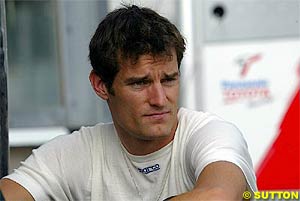 When I lived in Australia, a friend of mine used to come over to watch the Grands Prix. Bad coverage or not, we didn't miss any. But we needed to find something to keep ourselves amused (and awake), and so we spent the races making fun of the commentators. Daryl Eastlake never seemed to know who the drivers were, and World Champion Alan Jones rarely had a good word for any of them. Strangely, though, one of the few drivers they both knew and respected was a young, up and coming Australian named Mark Webber.
When I lived in Australia, a friend of mine used to come over to watch the Grands Prix. Bad coverage or not, we didn't miss any. But we needed to find something to keep ourselves amused (and awake), and so we spent the races making fun of the commentators. Daryl Eastlake never seemed to know who the drivers were, and World Champion Alan Jones rarely had a good word for any of them. Strangely, though, one of the few drivers they both knew and respected was a young, up and coming Australian named Mark Webber.
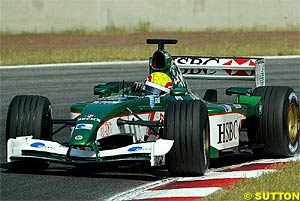 Webber's career is managed by Flavio Briatore the flamboyant Renault team chief who took Michael Schumacher to his first two World Championships and has been attempting to repeat the coup with his own drivers ever since, among them Jarno Trulli and Fernando Alonso. The latter in particular has been crossing roads with Webber the last couple of years: Webber took his seat at Minardi while the young Spaniard took his testing role in Renault/ex-Benetton. Now, Alonso is about to become the racing driver for Renault and one could be forgiven for thinking that Briatore's interests are conflicting at times.
Webber's career is managed by Flavio Briatore the flamboyant Renault team chief who took Michael Schumacher to his first two World Championships and has been attempting to repeat the coup with his own drivers ever since, among them Jarno Trulli and Fernando Alonso. The latter in particular has been crossing roads with Webber the last couple of years: Webber took his seat at Minardi while the young Spaniard took his testing role in Renault/ex-Benetton. Now, Alonso is about to become the racing driver for Renault and one could be forgiven for thinking that Briatore's interests are conflicting at times.
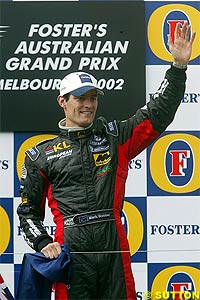 Take free practice on Saturday morning, for example: I was standing in the Minardi garage, in-between Webber's section and Alex Yoong's, and while it was fun to watch the mechanics buzzing around the cars, moving tyres and machines to and fro, it was striking to note how unaffected Webber seemed to be by all this commotion. He sat calmly while everyone moved around him, talking briefly to his mechanic and then passing the remote for the television over before driving out in the pitlane to run some laps. The calm on his side of the garage was remarkable, and everyone there seemed to move more fluidly, more easily than on the other side.
Take free practice on Saturday morning, for example: I was standing in the Minardi garage, in-between Webber's section and Alex Yoong's, and while it was fun to watch the mechanics buzzing around the cars, moving tyres and machines to and fro, it was striking to note how unaffected Webber seemed to be by all this commotion. He sat calmly while everyone moved around him, talking briefly to his mechanic and then passing the remote for the television over before driving out in the pitlane to run some laps. The calm on his side of the garage was remarkable, and everyone there seemed to move more fluidly, more easily than on the other side.
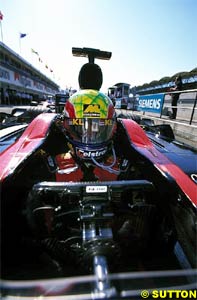 Webber: "No, not at all, not for me. Paul needs the money more than I do, in a way; he's got to run the team, whereas I've only got to run Mark Webber. So it's not a big issue for me. I've been paid by Renault this year to do my job, and I've done that, so I'm sort of over that stage. When you've arrived [into F1], you don't really need the big budgetary support that you need when you're trying to come through the junior ranks. It's a big problem - you haven't got it when you really need it, and you don't really need it when you've arrived and you've got a few sponsors behind you. Things change."
Webber: "No, not at all, not for me. Paul needs the money more than I do, in a way; he's got to run the team, whereas I've only got to run Mark Webber. So it's not a big issue for me. I've been paid by Renault this year to do my job, and I've done that, so I'm sort of over that stage. When you've arrived [into F1], you don't really need the big budgetary support that you need when you're trying to come through the junior ranks. It's a big problem - you haven't got it when you really need it, and you don't really need it when you've arrived and you've got a few sponsors behind you. Things change."
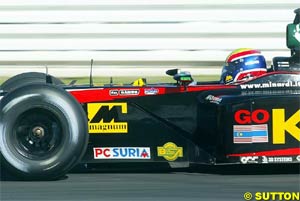 Webber: "Oh, absolutely! They were very keen to help me out, and I probably wouldn't be here without them. After Formula Ford, Formula 3 and then Mercedes I was at a very crucial stage in my career, and Paul basically gave me a free drive in Formula 3000, which is unheard of. It was a very lucky break for me."
Webber: "Oh, absolutely! They were very keen to help me out, and I probably wouldn't be here without them. After Formula Ford, Formula 3 and then Mercedes I was at a very crucial stage in my career, and Paul basically gave me a free drive in Formula 3000, which is unheard of. It was a very lucky break for me."
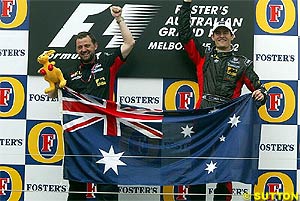 DC: Obviously it's easy to rate yourself against your teammate - Yoong, and Davidson when he was here - but how do you rate yourself against the other drivers?
DC: Obviously it's easy to rate yourself against your teammate - Yoong, and Davidson when he was here - but how do you rate yourself against the other drivers?
Paul Stoddart: The Proud Father
Please Contact Us for permission to republish this or any other material from Atlas F1.
|
Volume 8, Issue 39
Atlas F1 Exclusive
Interview with Mark Webber
Articles
50 Years of Ferrari at Indy
Jo Ramirez: a Racing Man
United States GP Preview
The US GP Preview
Local History: US Grand Prix
US Facts, Stats and Memoirs
Columns
The US GP Quiz
Bookworm Critique
The F1 FAQ
Elsewhere in Racing
The Grapevine
> Homepage |